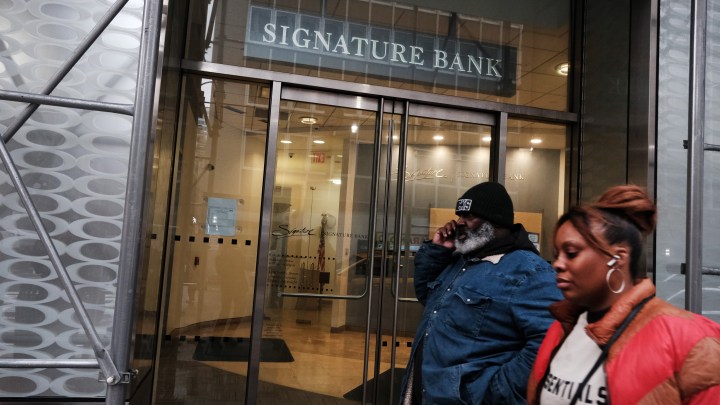
Federal bank regulators are getting most of the attention, but states oversee banks too
Federal bank regulators are getting most of the attention, but states oversee banks too

We’ve been talking a lot about Washington’s role in a banking crisis — the Federal Reserve and Federal Deposit Insurance Corp. in particular.
But the feds didn’t come in and take possession of Silicon Valley Bank and Signature Bank. That was up to state regulators in California and New York.
States play a major role in regulating finance, said Aaron Klein, senior fellow at the Brookings Institution.
“They regulate all of insurance. They regulate many banks. They regulate many credit unions,” he said.
In fact, Klein said that states were the only bank regulators throughout much of U.S. history.
“America only had state-chartered banks until the Civil War,” he added. “And up until the 1990s, most banks — regardless of federal or state charter — couldn’t really branch and exist outside of their main state.”
Silicon Valley Bank and Signature Bank were both state chartered, which is why state regulators stepped in first.
“At the end of the day, it is the state banking authority that has the authority to remove that charter, to revoke that charter and to put it into receivership when it goes insolvent,” said Cornelius Hurley, who teaches financial services law at Boston University.
Thing is, state regulators tend to be focused on what happens within their states, said Kathryn Judge, a law professor at Columbia.
“And no matter how diligent New York regulators are, it’s not the role of New York regulators to try to figure out what the consequences might be in other states should a New York bank fail,” she said.
But Judge said the recent failures are so big that they could have systemic consequences. And in cases like these, “the onus is always going to land on federal regulators to really make sure they understand what are the risks to which this institution is exposed? What are the steps it’s taking to manage those risks?” she said.
That’s why state and federal regulators acted together, Judge said.
There’s a lot happening in the world. Through it all, Marketplace is here for you.
You rely on Marketplace to break down the world’s events and tell you how it affects you in a fact-based, approachable way. We rely on your financial support to keep making that possible.
Your donation today powers the independent journalism that you rely on. For just $5/month, you can help sustain Marketplace so we can keep reporting on the things that matter to you.


















